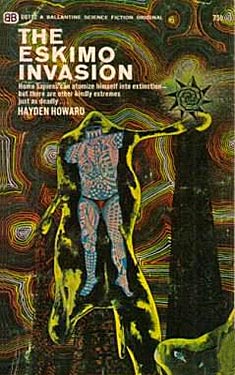 This is another book that hasn't done such a good job of standing the
test of time. I have no idea how this book looked the year it was
published, but now it has been largely forgotten by history due to the
racism, sexism and badly misunderstood science that fills the book.
There is no way a novel like this could get published today, though
that's not to say it is completely without merit. One of the reason
awards lists like the Hugo and Nebula are important is that they give us
a window into the time period in which the books are written. And the
fact that this book was nominated at all proves that it's worth a read
if only to see what people were reading back in the day.
This is another book that hasn't done such a good job of standing the
test of time. I have no idea how this book looked the year it was
published, but now it has been largely forgotten by history due to the
racism, sexism and badly misunderstood science that fills the book.
There is no way a novel like this could get published today, though
that's not to say it is completely without merit. One of the reason
awards lists like the Hugo and Nebula are important is that they give us
a window into the time period in which the books are written. And the
fact that this book was nominated at all proves that it's worth a read
if only to see what people were reading back in the day.
This
review area is not a spoiler free space, as I normally write under the
assumption that those reading have already completed the novel. I want a
space for people who have finished a book to be able to seek others'
opinion. So normally I won't go real big into plot summaries, I've
never really liked reading reviews that are book reports. But, no one
has read this book, and my review will not inspire people to read this
book, so I'll break the plot down as neatly as I can. A man has sex with
an Inuit woman only to find that she gives birth only a few weeks
later. That child matures in only a few months, and pretty soon starts
giving birth to more children that mature in only a few months. After a
little while the entire world fills up with "Eskimos," insanity
ensues. There's a space alien that made this happen and wants them all
to die at the same time so their "death energy" can fuel him on to
bigger and better things. No book ever written stands up well to the
five sentence summary, but that's about the best I've got for this
book. Though like I said this book is not without merit.
| Try to Imagine the story that goes with | this |
This novel is a great example of the roots of science
fiction. If you go back to the early days of science fiction you'll
find that sex and violence were a huge part of the genre. The pulp
novels of the 40s and 50s are the roots of the genre, and anyone who's
ever read any of those books from before there were Hugo's or Nebula's
knows that they often aimed right for the lowest common denominator.
Just look at Burrough's 'A Princess of Mars,' published in 1917 the
entire book dances around the idea of sex between the two main
characters. And that's one of the more tame novels from the time, just
looking at the covers to some of the cheaper pulp magazines is enough to
make you giggle today. 'The Eskimo Invasion' presents a natural
evolution between what science fiction was in it's infancy and what it
was becoming. The author brings in enough of the sex and violence of
the pulp era but attempts (not always successfully) to tell a meaningful
and compelling story.
There are some interesting
ideas present in this novel. Often a novel can succeed with only a good
idea to propel it along. There are many examples of poorly written
novels that have a story strong enough that it just doesn't matter, I
talked about this with 'Dark Universe' but 'Tau Zero' is probably an
even better example. I don't know if 'The Eskimo Invasion' qualifies
for this type of exemption, but I can see how some people could enjoy
the novel. The concept is out there, and just when you think you have
the novel figured out the author takes it one step further and things
get even weirder. Not a bad thing for a novel.
In the
end this is still a very interesting novel, and a good indicator of the
pulp fiction of the times. I don't know if I would recommend it to the
casual reader of science fiction, but more for those who want to know
how the genre got started and those who want to read something weird. I
will say that it probably has the coolest cover of all time, and if I
were a fifteen year old that would be a blown-up poster on my wall.
Also interesting is that this book is so forgotten by history that there
really aren't that many reviews about it on the internet. As such it
seems like it's gained a kind of hipster cred, where the few reviews
there are only talk about how good it is and how everyone should read it
just because it's obscure and forgotten. Really I think I've got the
only negative review on the internet and that seems weird for this book
(though I talked to one of the people who'd read it and he actually
seemed to have enjoyed it, so maybe it's me).
No comments:
Post a Comment